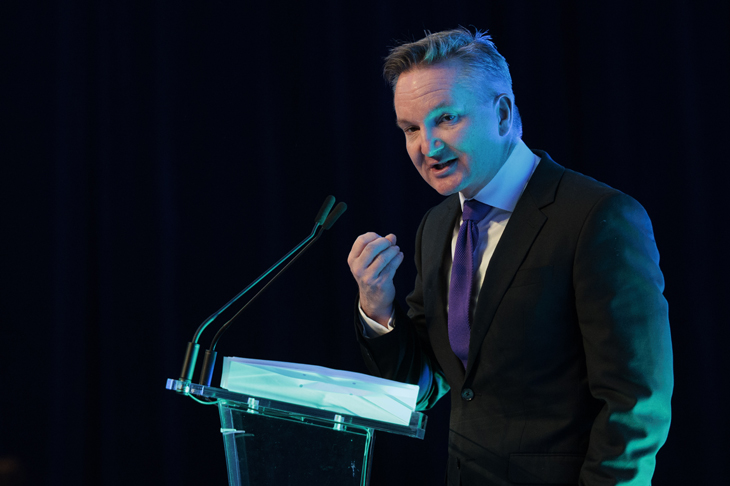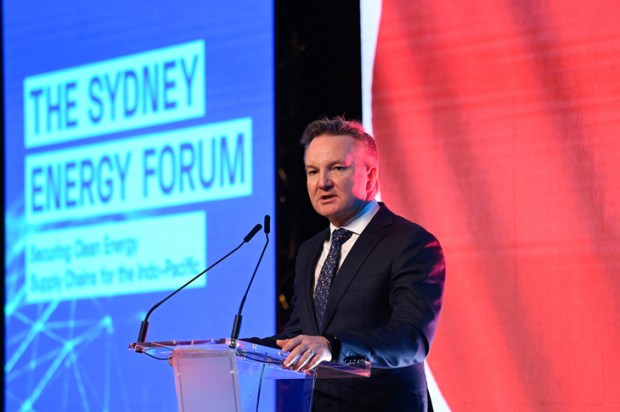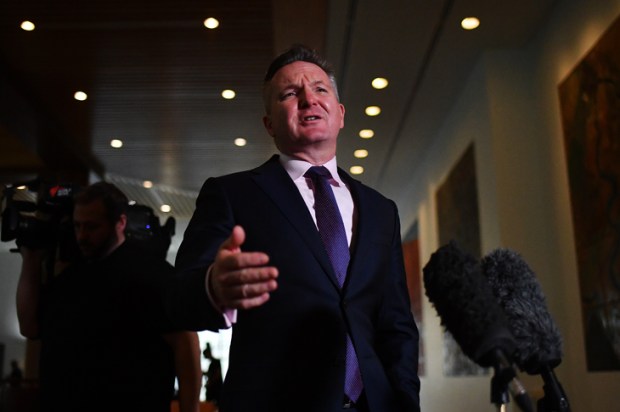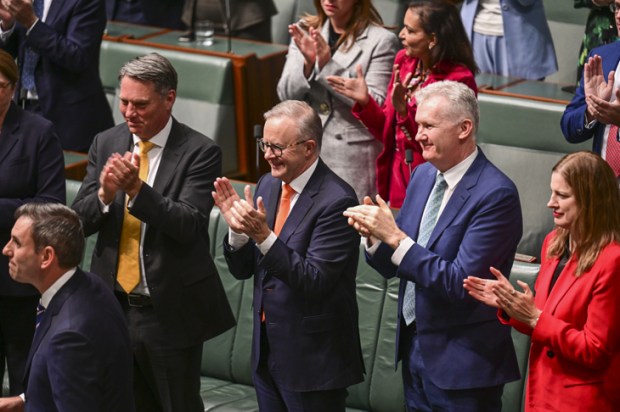I’m sure quite a few Speccie readers agree with my assessment that B1, Climate Change and Energy Minister Chris Bowen, is clearly on top of the ladder of dangerous and incompetent ministers, with a clear gap between him and other contenders.
Each week he makes another dubious decision, delivers a ridiculous speech, sets out a new path of destruction. How can anyone compete with that? (OK, B2, Employment and Industrial Relations Minister, Tony Burke, may give it a crack soon. We’ll see.)
As I wrote last week, B1 is finding himself in a right-royal pickle with the slow rollout of new transmission lines. The costs are exploding and the locals are revolting. It’s now clear that the target of an additional 10,000 kilometres of transmission lines won’t be achieved by 2030 – it could be less than half that distance.
He also made the unexpected decision to reject Alinta Energy’s plan to construct a cluster of offshore windmills near Warrnambool in western Victoria to provide up to 1000 megawatts of power, including to the local aluminium smelter at Portland. These massive turbines were to be located 10 kilometres offshore at depths of around 30 to 60 metres. But when some Indigenous groups objected – they, of course, have a special social licence – B1 decided that declining the approval was the least-worst option, telling the company to locate the turbines 20 kilometres offshore and to put them on floating platforms using an untested technology. In all likelihood, that’s the end of the project and the end of the smelter too.
Given the grief the electricity system has been giving B1 – nothing seems to be going to plan – our plucky Climate Change Minister has decided to turn his attention to other emitting sectors and to impose his dictatorial edicts on them. In the firing line are agriculture (naturally), road transport and waste management.
Let’s be clear: Bowen is coming for the farmers. In point of fact, governments have been coming for farmers for many years; it’s just that B1 wants to ramp up the attacks. State government restrictions on land clearing are a case in point, as governments insist on farmers limiting the use of their own land – for environmental reasons, you have to understand. The fact is that farmers are the best custodians of the environment around, with just a few exceptions. This is a point that politicians and bureaucrats seem incapable of grasping.
Bowen’s plans for agriculture include restricting the use of nitrogen-based fertiliser based on the spurious argument that the release of nitrous oxide contributes to climate change; reducing herd sizes because of the methane produced by animals; and making the receipt of carbon credits on fallow/destocked land more lucrative for landholders than undertaking agricultural pursuits. It’s Netherlands, here we come.
Bear in mind here that B1 willingly signed us up to the US-sponsored Global Methane Pledge which involves a reduction of 30 per cent in methane production by 2030 compared with 2020 levels. President Biden was persuaded to promote this pledge on the basis of (misleading) information that mending leaking natural gas pipes in the US would be sufficient to meet the target and farmers could be left alone.
The Coalition government at least had the sense to refuse to sign this methane promise although the luvvies at the Department of Foreign Affairs and Trade were very enthusiastic for it to happen. It took B1 only a matter of weeks to settle into his ministerial office to overturn the Coalition’s decision, even though the advice of everyone who knows anything about these things is that compelling farmers to reduce their herd sizes, including dairy farmers, must be one of the main avenues for Australia to meet the target.
Let me just pause here to lay into the National Farmers’ Federation, which is still headed by Fiona Simson. Do not forget that the NFF has endorsed the pursuit of Net Zero 2050. Working on the basis of the insane assumption that this climate target could actually benefit the agriculture sector, the NFF has become a major negative when it comes to representing the best interests of farmers. The fact that B1 is about to impose all sorts of damaging interventions on farmers should hopefully mean that the NFF finally comes to its senses, including a change of leadership.
B1 is also keen to push on with road transport. He will use the mandated change to the emissions standards for vehicles as the cunning means to drive up the price of petrol/diesel cars and reduce the price of electric vehicles.
This is because the new standards will need to be met by car makers across their entire fleet of vehicles. The end result is that the new standards will only be achieved if EVs are significantly cross-subsidised to achieve higher sales, thereby driving up the price of petrol/diesel vehicles.
This policy completely ignores the preferences of consumers, with the vast majority still baulking at the prospect of buying an EV because of the cost and inconvenience of charging, particularly given inadequate charging infrastructure. Notwithstanding the array of subsidies thrown at EV purchasers, including the exemption from fringe benefits tax, demand for EVs in Australia remains stubbornly low.
An additional possibility is for B1 to make petrol/diesel cars prohibitively expensive by imposing a direct surcharge on their purchase. This is one of the ways in which high EV penetration has been achieved in Norway: the tax on petrol/diesel cars is around half the purchase price. In Australian terms, this would mean paying upwards of $15,000 just for the privilege of buying a normal car. Some cabinet colleagues might just warn him about the political backlash, but when you are saving the planet, what the heck.
And did I mention hydrogen? It’s not really worth wasting words on discussing this, but B1 will probably throw it into any discussion about reducing road transport emissions.
When it comes to waste management, expect a raft of new regulations about the operation of landfills and recycling requirements. The fact that modern landfills are now efficiently managed using membranes and the capture of methane will be totally ignored by B1. Local governments will lap up the initiatives as they will support higher rates and intrusive dictates on the residents. One little problem for B1 is that these initiatives will inevitably drive up the cost of living for ordinary folk, which could easily have negative political consequences. B1 will no doubt think that it’s is just a matter of careful communication.
Of course, you could think that B1might be concerned about voter reaction to his costly climate crusade. But that would be to mistake the real audience – caucus members from the left and Labor party rank-and-file members. For someone from the right, these are the key players in his quest to become PM; hang the voting public.
Got something to add? Join the discussion and comment below.
Get 10 issues for just $10
Subscribe to The Spectator Australia today for the next 10 magazine issues, plus full online access, for just $10.
You might disagree with half of it, but you’ll enjoy reading all of it. Try your first month for free, then just $2 a week for the remainder of your first year.














Comments
Don't miss out
Join the conversation with other Spectator Australia readers. Subscribe to leave a comment.
SUBSCRIBEAlready a subscriber? Log in